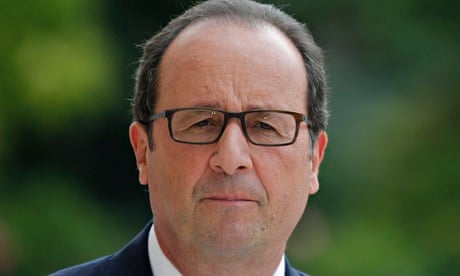It was about as dramatic as a political moment gets. Last Monday, the French prime minister, Manuel Valls, tendered the resignation of his entire government. Twenty-four hours later, President Hollande abandoned his two-year effort to keep the Socialist party's factions together and reappointed an unashamedly pro-business, reformist new cabinet. In particular, he replaced economics minister, Arnaud Montebourg – left wing, anti-German right, anti-globalisation – with a pro-business, ex-Rothschilds social liberal, one Emmanuel Macron. It is the last throw of the dice for the beleaguered François Hollande.
To say a lot hangs on the success of the Valls 2 government is an understatement. The "secular stagnation", a term coined by economist Alvin Hansen in the 30s, that afflicts all western economies is particularly acute in France and it's not obvious how to solve it. The EU, German austerity, the European Central Bank (ECB) and the dominance of bankers and finance are getting ever more of the blame.
Nor is the issue solely about economics. There is a general gloom, or morosité, as the locals call it. Until German reunification, France was the senior political partner in the partnership with West Germany that ran the EU. Now it is a diminished force, resenting its neighbour and no longer the EU's playmaker. What does it mean to believe in France? What does the future hold? How do you do capitalism that delivers jobs and fairness?
Despite a better initial recovery than Britain's, the French economy is stagnating and unemployment remains at 10%. Hollande's initial ideas, notably his 75% income tax rate, were no economic elixirs and he seems directionless. His opinion poll ratings are at new lows and his party's "social liberals" are at war with its self-styled true guardians of socialism.
The right is no less factionalised, plunged into a scandal over campaign financing, with major figures such as the former president, Nicolas Sarkozy, under police investigation. Into the breach is stepping the charismatic Marine Le Pen, leader of the Front National, who thinks the recipe is to leave the EU, for France to control its borders against immigrants and to embark on policies of economic autocracy in the name of patriotism. Le Pen now leads the opinion polls.
If Valls and Macron cannot turn the economy around before the presidential elections in 2017, the ludicrous Nigel Farage and his posturing new sidekick Douglas Carswell will find their destructive work done for them. The EU could not survive the departure of France under a le Pen presidency. Our continent would collapse into beggar-my-neighbour economic policies, competitive devaluations, trade protection and slump. Euroscepticism would have scored its empty victory.
Nor is this far-fetched. In 2002, Le Pen's father, Jean-Marie, won 18% of the vote in the presidential run-off against Jacques Chirac. Twelve years later, his daughter is carefully building a coalition beyond the racist, neo-Nazi fringe. The mainstream worries that morosité, a slow growing economy and a desire to reassert France and Frenchness may make her impossible to beat.
The trigger for Valls's resignation was a speech by Arnaud Montebourg last Sunday. He is a big fish in his party, coming third in the last Socialist presidential primary. Ambitious French politicians make statements in books and last September he set out his manifesto in La bataille du Made in France . Young inventors are today's "sans-culottes of the third industrial revolution", he argued, and should be nurtured and protected by the state rather than left to the mercies of free trade and ruthless finance, the "invisible enemy". He called for a version of the successful protectionism of Louis XIV's first minister Colbert – "participative colbertism" – to be underwritten by the same popular protectionism that characterises the US. As minister for "productive renewal", he identified 34 sectors the state would support. He also criticised the EU for its attachment to free trade and identified it as the obstacle-in-chief in his battle for "made in France".
Promoted in March in the Valls 1 government, his patience finally gave way. The economics minister of just 147 days urged a "just and sane resistance" to the austerity obsessions of his enemies – "the German right" – who were locking Europe in stagnation. Valls immediately told Hollande that he had to choose: "Him or me.". Hollande chose Valls and appointed Emmanuel Macron as economics minister, who is openly critical of the talismanic Socialist policy, the 35-hour week.
A day later, the emboldened Valls earned a standing ovation at the annual MEDEF conference of business leaders when he declared: "J'aime l'enterprise." Two years ago, President Hollande said he "did not like the rich" and that his "real enemy is the world of finance". It is quite a journey.
In many respects, France suffers from an unfair press. Many multinationals are global leaders: productivity is much higher than the UK's and its share of world markets stable, while ours is falling. France is forecast to grow at 1.5% for the next five years, Britain at 2%. A growing number of economists are noting that, independent of currency arrangements and economic policies, ever lower interest rates are stimulating much less investment and growth. Old technologies are not worth investing in, but it is not clear which new technologies will underpin the economy. Uncertainty abounds. You can crush trade unions in the name of labour market flexibility or try participative colbertism: investment fails to respond in either case. This is secular stagnation.
Valls and Macron have to do two things. They must use their pro-business, pro-EU credentials to insist that Germany allows the ECB and governments to tackle secular stagnation head on: the ECB must flood the European banking system with cash and governments given the fiscal headroom to boost demand. They must also develop much smarter support for the new sans-culottes. They need processes that enable them to be fast and smart, hiring and firing when necessary, but underwriting the new risks of being a worker and entrepreneur. In short, they need a wholesale recasting of the welfare, labour market and innovation systems to be both capitalist- and worker-friendly. That is what social liberalism means.
Secular stagnation will end: the 2020s promise to be a European boom time. But if the EU is to get there without falling apart first, it needs some creative leadership. What happened last week could be a watershed. If it isn't, it's time to fear for our continent.

